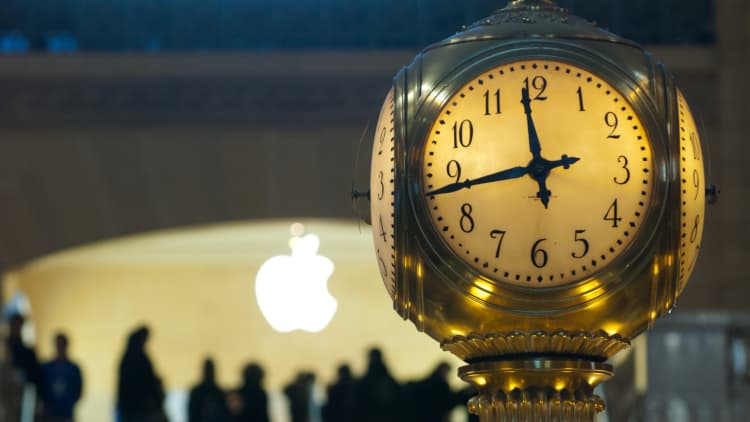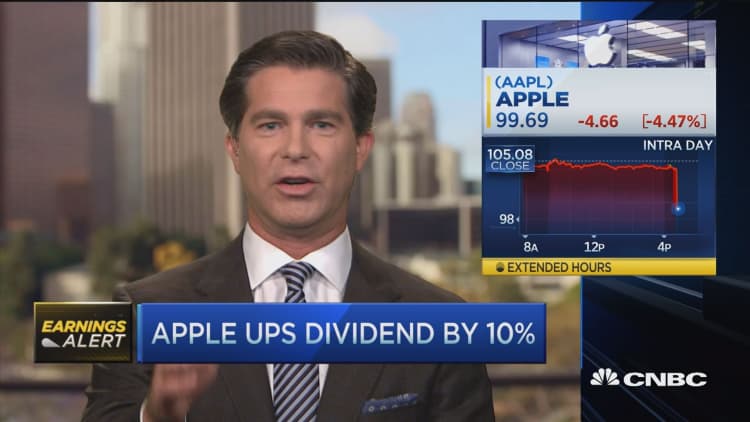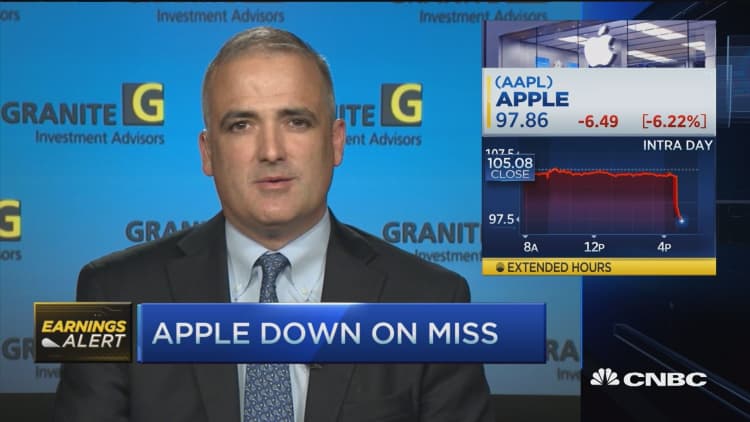


Apple reported quarterly earnings and revenue that missed analysts' estimates on Tuesday, and its guidance for the current quarter also fell shy of expectations.
The tech giant said it saw fiscal second-quarter earnings of $1.90 per diluted share on $50.56 billion in revenue. Wall Street expected Apple to report earnings of about $2 a share on $51.97 billion in revenue, according to a consensus estimate from Thomson Reuters.
That revenue figure was a roughly 13 percent decline against $58.01 billion in the comparable year-ago period — representing the first year-over-year quarterly sales drop since 2003.
Shares in the company fell more than 8 percent in after-hours trading, erasing more than $46 billion in market cap. That after-hours loss is greater than the market cap of 391 of the S&P 500 companies.
Importantly, the company announced a 10 percent dividend increase and a $50 billion increase to its capital return program. Under that new plan, Apple expects to spend a total of $250 billion of cash by the end of March 2018, it said.
On the dividend, Apple said its board had declared a dividend of $.57 per share, payable on May 12, 2016 to shareholders of record as of the close of business on May 9.
A key reason for the declining revenue was Apple's year-over-year decrease in iPhone sales. Despite this, Apple CEO Tim Cook told CNBC Tuesday that the company is in "the early innings of the iPhone."
In fact, Apple beat Wall Street's estimates on iPhone shipments, reporting 51.19 million for the quarter. Analysts had expected 50.3 million, according to StreetAccount.
Still, that iPhone unit count was a 16 percent decline from the 61.17 million shipped during the same period last year. For his part, however, Cook described the iPhone business as "healthy and strong" on the call.
In fact, Cook said the company added more switchers from Android and other platforms in the first half of the year than in any other six month period ever.
On Apple's "services" business, Cook said that segment saw its best ever revenue in the March quarter (ignoring sums from a patent settlement in an earlier quarter). Services brought in $5.99 billion in Q2 — topping analyst estimates of $5.78 billion, according to StreetAccount.
Services was Apple's second-largest source of revenue (behind the iPhone) in the quarter, the company said. And unlike the 18 percent decrease in iPhone revenue against the comparable year-ago period, services revenue grew 20 percent year-over year.
The Apple Watch, one of the company's primary bets on capturing growth outside of the iPhone "has quickly become the best-selling and most-loved smartwatch in the world," Cook said.
"We believe it has an exciting future ahead," he added.
Looking ahead to the fiscal third quarter, Apple said it expects revenue between $41 billion and $43 billion — Wall Street had expected $47.42 billion on average, according to StreetAccount.
Apple CFO Luca Maestri pointed to the ongoing quarter's tough comparison against an "incredible strong" June quarter in 2015. Additionally, he cited a "continued weak macro environment this year, and a stronger U.S. dollar."
Cook sounded an optimistic note about the company, concluding his prepared remarks by saying "the future of Apple is very bright."
At the top of the company's earnings call, Cook said that Apple had seen "continued currency weakness in the vast majority of our international markets." And Maestri, said that the average iPhone price fell from $659 in the year-ago period to $642 in the fiscal second quarter.
The difference was largely attributable to "weak international currencies, and very popular mid-tier and entry offerings," Maestri said.
One area of weakness for Apple in its second-quarter was the Greater China segment — comprising mainland China, Taiwan and Hong Kong. Revenue for that region fell 26 percent year-over-year to $12.49 billion. Previously, that area had posted consistent growth for Apple.
Still, "we feel good about China," Cook told CNBC.
"We remain very optimistic about the China market over the long term, and we are committed to investing there for the long run," Maestri said.
The "vast majority" of the weakness in that geographic segment has come from Hong Kong, Cook said on the call, explaining that the city has seen international tourism fall as a result of its currency being pegged to the U.S. dollar. Mainland China, on the other hand, was only down 11 percent on a reported basis — 7 percent on constant currency.
"China is not weak, as has been talked about," Cook said. "I see China as — we may not have the wind at our backs that we once did, but it's a lot more stable than what I think is the common view of it."
Apple shares have struggled of late, falling about 20 percent over the last year.
Part of that decline is attributable to stalling iPhone sales. The device usually accounts for more than half of Apple's revenues, but it struggled to achieve significant year-over-year growth during the fiscal first quarter, and analysts were even less optimistic about the second quarter.
Many analysts, however, say they expect iPhone sales to grow again when the company releases its expected iPhone 7 model.
—CNBC's Josh Lipton contributed to this report.



